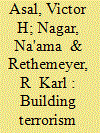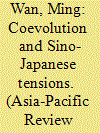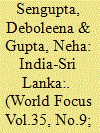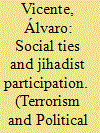|
|
|
Sort Order |
|
|
|
Items / Page
|
|
|
|
|
|
|
| Srl | Item |
| 1 |
ID:
141472


|
|
|
|
|
| Summary/Abstract |
In April 1984, 25 members of the Jewish Underground were arrested by the Israeli General Security Service moments after they had planted explosives in five Palestinian-owned buses. Their arrest and sentencing brought to an end one of the more sophisticated expressions of Jewish terrorism since the birth of Israel. Overall, the group planned four operations, one of which was the conspiracy to bomb the Muslim holy sites on the Temple Mount. As we outline below, social links between the members of the Jewish Underground significantly facilitated the creation of this organization. We demonstrate that social capital, here expressed in terms of networks, trust, and norms – which are widely considered important components of a healthy democracy – can take a negative turn toward participation in terrorism.
|
|
|
|
|
|
|
|
|
|
|
|
|
|
|
|
| 2 |
ID:
131846


|
|
|
|
|
| Publication |
2014.
|
| Summary/Abstract |
Unlike those who blame the other side or structural forces beyond one's control for the current Sino-Japanese tensions, this paper offers a theoretical insight about the coevolution between China and Japan to explain why the two Asian great powers that had a better relationship in the past are now experiencing greater tensions when their much closer economic and people-to-people ties should facilitate greater cooperation. The two nations have coevolved over millennia with increasing intensity over time. They avoided serious tensions in the 1970s-1990s partly thanks to each being situated in a different niche. But that separation has diminished in a globalizing world and the two countries are becoming more integrated, which has triggered a backlash. The earlier generation of proponents of Sino-Japanese friendship succeeded in forging strong economic and social ties, but the current generation finds it difficult politically and psychologically to manage the new reality in their relations.
|
|
|
|
|
|
|
|
|
|
|
|
|
|
|
|
| 3 |
ID:
133909


|
|
|
|
|
| Publication |
2014.
|
| Summary/Abstract |
India and Sri Lanka, the two very close neighbours, are separated by a narrow stretch of water called Palk Strait. The history and mythology of the two countries are inter- related and the social ties between the two is more than 2,500 years old and both sides have built upon a legacy of intellectual, cultural, religious and linguistic intercourse. Shortly following independence, the major tribulations bedevilling the rapport of both the countries were the question of citizenship of the persons of Indian Origin resident in Sri Lanka, the majority of who had migrated to the Island during the British Period to the Coffee and subsequently tea plantations.
|
|
|
|
|
|
|
|
|
|
|
|
|
|
|
|
| 4 |
ID:
191057


|
|
|
|
|
| Summary/Abstract |
The relationship between social ties and jihadist participation has garnered substantial attention from terrorism scholars. However, further research is needed to understand what specific properties of interpersonal bonds influence terrorist involvement and how they operate. Drawing on social network theory, the current study tests the effects of the type, number, and strength of interpersonal ties with jihadist activists in explaining the occurrence and absence of individual engagement in jihadist activities. For that purpose, this paper analyzes the social links of twenty-three youths involved in terrorism and twenty-one youths who, despite their attitudinal affinity with jihadism, did not take part in such actions. Combining quantitative and qualitative data and methods of analysis, the study found empirical evidence that participation in jihadism is affected by the number of connections between young people and the global jihadist movement. It also found partial support for the relationship between tie strength and jihadist involvement. However, it rejected the assumption that the type of social tie influences participation.
|
|
|
|
|
|
|
|
|
|
|
|
|
|
|
|
| 5 |
ID:
170018


|
|
|
|
|
| Summary/Abstract |
This article examines the impact of social ties on a challenger's ability to initiate a civil resistance campaign. Recent waves of nonviolent uprisings, from the color revolutions of Eastern Europe to the Arab Spring, have sparked renewed scholarly interest in civil resistance as a strategy in conflict. However, most research has focused on the effectiveness and outcomes of civil resistance, with less attention paid to when, why, and how challengers to regime power come to embrace a strategy of nonviolent action in the first place. Drawing upon a longitudinal analysis of challenger organizations and coalitions in Nepal, this article illustrates how social ties inform challengers’ assessments of the viability of civil resistance and consequently shape their strategic behavior. The findings complicate state-centric approaches to contentious politics by showing how diverse actors within the same state face different sets of political opportunities and constraints. They also highlight the indeterminate effects of ideology, as variation in challengers’ social ties drive Gandhians to take up arms and Maoists to lay them down.
|
|
|
|
|
|
|
|
|
|
|
|
|
|
|
|
| 6 |
ID:
191880


|
|
|
|
|
| Summary/Abstract |
International cooperation between intelligence services poses a dilemma. It is an important tool in countering today’s complex transnational threats, but at the same time, cooperation is a risky business. Intelligence services can never be sure that a partner will reciprocate in kind. Scholars and practitioners often identify trust as one of the foremost conditions to overcome this dilemma. Yet the notion of trust is seldomly conceptualized in these rational-calculative explanations. Contrary to the common view that intelligence services are exceptional in their opportunism and rivalry, social relations and trustworthiness perceptions provide a more dominant explanation for the level of cooperation between intelligence partners than is often assumed by scholars and practitioners. Known reputations, recognized professional standards, and shared traits socially bind intelligence professionals to their community of practice, enabling them to bridge divides like nationality and even conflicting interests. Intelligence services resemble many other organizations in the public and private domains, requiring a de-exceptionalization of their international cooperation.
|
|
|
|
|
|
|
|
|
|
|
|
|
|
|
|
|
|
|
|
|